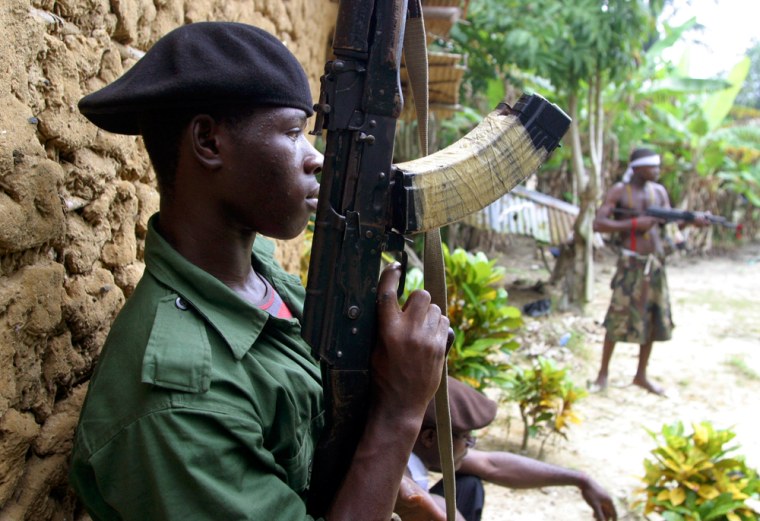Admirers call him Africa’s Robin Hood of oil. Nigerian authorities call him an outlaw in the mold of Al Capone.
Leading gunmen who worship a god of war, Alhaji Dokubo-Asari is trying to wrest the oil-rich Niger Delta away from multinational oil giants and the government — and put it into the hands of “the people.”
Intensifying conflict across the delta has killed more than 1,000 people and left villages in flames. Fighting in the west at times has cut up to a quarter of production in the world’s No. 7 oil exporter, the United States’ fifth-biggest oil supplier.
Although it’s difficult to determine the strength of Dokubo-Asari’s movement in the eastern delta, an Associated Press visit found the warlord leading a more organized campaign than previously realized. Dozens of his fighters, armed with AK-47 assault rifles, control the ruins of several towns and villages outside the key oil city of Port Harcourt.
“This is a broad-based armed struggle. If I die tomorrow, someone will take my place,” said Dokubo-Asari, who says his heroes include South African anti-apartheid leader Nelson Mandela and al-Qaida chief Osama bin Laden.
A mix of fighters
A 40-year-old who converted to Islam as a university student, Dokubo-Asari commands an ethnically diverse mix of fighters who chiefly worship Egbesu, the traditional god of war for ethnic Ijaw.
Security analysts increasingly compare the scale of violence in the delta to Chechnya and Colombia. Militants from various ethnic groups and gangs of thugs roam much of the Scotland-sized delta, laying siege to oil pipelines, drilling rigs and export shipping terminals. They also fight soldiers and each other, often from speedboats mounted with automatic weapons.
Oil companies insist Dokubo-Asari’s eastern-based campaign has yet to affect production. The impact has been in the west, where ethnic leaders battle for shares of the oil wealth.
Dokubo-Asari is alone among the delta’s faction leaders in openly challenging the government in Abuja led by President Olusegun Obasanjo, a retired general whose 1999 election ended 15 years of military rule.
“Our people don’t need a leader to tell them what to do. They know their enemy is in Abuja and they are ready to fight him,” Dokubo-Asari said.
Obasanjo government under fire
He, and others in the delta, accuse Obasanjo’s government of rigging the president’s 2003 re-election, squandering the country’s $20 billion in annual oil revenues, and doing little for the people of the oil region.
Dokubo-Asari talked with AP in Okorota, a fishing village that stood abandoned apart from about 40 fighters, who use such nicknames as “Fire Burn,” “Blackie” and “Cooking Spoon.”
The fighters wore the white headbands of tribal warriors — “symbolizing strength,” their leader said.
Walls and doors of bullet-pocked mud huts lay bashed in, the result, Dokubo-Asari claimed, of an army offensive in early June.
Residents who fled to other towns say the attack killed dozens, including many unarmed villagers.
Authorities say soldiers and police carried out a raid to “root out criminals” and seize illegal weapons, and deny that anyone was killed.
Dokubo-Asari boasted of killing police and sailors — “in self-defense.”
It’s an unusually brazen claim in Africa’s most populous nation. Twice, in 1999 and 2001, the army killed hundreds of villagers in apparent retaliation for slayings of police by militants.
‘He is like Robin Hood’
Dokubo-Asari is idolized by some delta residents, who harbor bitter resentment toward Nigeria’s government for the slow pace of development in oil-rich areas. Paved roads, electricity, running water, schools and hospitals remain scarce.
“You can say he is like Robin Hood,” said Angela Dickson, now living in Port Harcourt after fleeing the fighting. “Our own government is corrupt and they hate us.”
Dokubo-Asari said he admires terrorist leader bin Laden for fighting “on behalf of all Muslims,” but insisted he is not fighting a religious war and never targets civilians.
His opponents — including the government — brand Dokuko-Asari a mere thug who enriches himself through armed robbery and oil theft, forging self-serving alliances with other warlords and local politicians.
‘Think of Al Capone’
Some people accuse his forces of summarily killing critics, including civilians who dared to speak out. “Think of Al Capone. It is no different,” said Magnus Abe, information commissioner for Nigeria’s Rivers state.
Government officials say Dokubo-Asari finances his fighters by tapping oil pipelines to steal crude for sale locally and abroad.
The practice, known as “bunkering,” results in countrywide losses as high as 100,000 barrels a day, or about 5 percent of Nigeria’s production.
While defending bunkering by poor residents as morally “legitimate,” Dokubo-Asari denied doing it. He said he sustains his movement with earnings from a “small oil refinery” run by his men.
When a boatload of strangers approached Okorota, Dokubo-Asari’s fighters cocked their weapons, screaming “spy!” and “navy!”
The visitors timidly identified themselves as oil workers who — with armed police escorts — were seeking “permission” to survey the riverbed.
“Come back tomorrow,” Dokubo-Asari gruffly ordered the visitors.
“Give us money!” one of his fighters demanded. As journalists watched, the warlord quieted his fighters, barking orders not to harass the oil crew.
